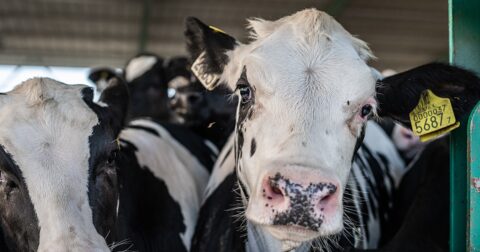Reported
Dairy Digesters Presented At Congressional Briefing As a Solution to Curbing Methane Emissions
Climate•6 min read
Perspective
Potty training cows to curb emissions seems like a harmless idea, but it's no silver bullet. In fact, it does more to distract from the problem than solve it.


Words by Jack McGovan
Gene editing farmed animals to make them more resistant to the climate crisis is the newest idea being pegged as the savior of factory farming. Although a far-fetched idea, it’s not the most ridiculous to circulate in recent times. A few weeks ago, many outlets published an article about the idea of potty training cows in an attempt to reduce ammonia emissions from their feces and urine. Earlier this year, others were discussing how we could make cows wear masks that convert their methane burps into carbon dioxide. On the outside, these initiatives seem quite harmless—a side effect of their silly nature. But these ideas serve a more nefarious narrative: that it is animals and their bodies to blame for the climate crisis, not the way we farm them.
There are a number of different reasons given for supporting these initiatives. Among the main ones are that they can help reduce the environmental impact of animal agriculture, help develop resilience in animals against heatwaves and droughts, and help reduce the spread of disease. But would the benefits be proportional to the time invested? Potty training the 1.5 billion cows that are consumed every year would be a massive undertaking, as each one would require individual attention. Similarly, fitting all of those cows with a mask that must be carefully monitored and replaced if faulty would require constant supervision. Gene-editing, in all fairness, would be easier to implement, despite conversely being the most dystopian of them all.
This obsession with changing animals’ bodies and natural behaviors completely distracts from the real issue: that raising so many animals in confined conditions is a human problem. Forcing an animal to relieve itself in a specific location or breathe through a mask isn’t going to reduce the amount of food or water it needs to reach slaughtering age. Forests will still be torn to the ground, and ecosystems wiped from the face of the Earth to meet the demands of animal agriculture. Gene-edited pigs could in theory be made to resist viral infections commonly found on factory farms that could jump to humans, but that will do nothing to stop zoonoses like COVID-19 emerging in the wild—the likelihood of which is linked to deforestation, among other factors. This would also do nothing to curb the excessive use of antibiotics in livestock rearing that are used not to fight infections, but to simply make the animals grow faster. Nor would any of this do anything to stop the human rights abuses that underpin cheap, accessible meat.
These solutions are the equivalent of using glass jars to store carbon dioxide from the exhaust pipe of a car—trying to be useful, yet showing ignorance of what the core issues are. We need to be looking into other ways of eating and food production, not continuing to expose animals to humiliating experiments in the name of science and progress. Real alternatives exist that could liberate both humans and animals from the grip of corporate food production.
The first option would be to move to a food system that is based on beans, nuts, and lentils, rather than bacon, breasts, and tendrils. If moving away from meat proves too difficult, then it would make much more sense to invest in technologies that actually have a chance of eliminating the core issues of animal agriculture. Cultured meat, for example, could significantly reduce the environmental impact of meat consumption, but only after many prominent issues have been ironed out. This would require funding, and preferably public funding, to stop the field from being captured by corporate interests. Plant-based meat replacements are perhaps an even more viable alternative if issues of taste and texture can be solved.
Supporting potty-trained, mask-wearing cows is a clear sign that you don’t want to change anything about our food systems. Factory farming and the conditions animals are reared in are symptoms of a human condition—an addiction to eating animals. Animals are not to blame for being themselves in an environment that restricts them in every other possible way. To blame them for the side effects of their oppression is a new level of cruelty. Instead of looking at animals, we should be putting ourselves under the microscope to find the answer to a sustainable food system: that it is time to manipulate and change our own behaviors.